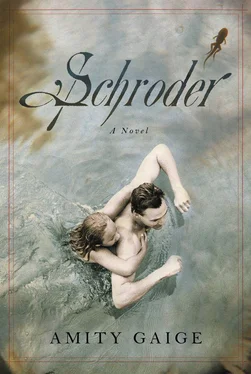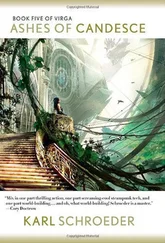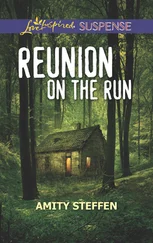I looked. My daughter’s arms were wrapped around her orange bucket. Her mouth was set in a wry smile, and I could almost hear her making wild promises to herself. Her white hair was being sucked in ribbons out the window, giving her a bizarre, mythical look. This, I thought, this is what I wanted? This rumpled, sandy child with an abnormally high tolerance for upsetting turns of fate? With a sick twisting in my conscience I saw that I had been waiting to see if she could do it, if she had the capacity to tolerate the world as it was according to me — a mess, a random and catastrophic mess — and if she could stand it. And there she was in the backseat, standing it, the third in a trio of missing persons, and there she would be, in some ways, forever, wouldn’t she? Because when she was older, might her familiarity with people like me or April consign her to their company, so that she would be drawn to them and would travel with them in their VW vans or the sidecars of their motorcycles, forever along the edges of things, until she would be, in the end, more comfortable with freaks and eccentrics than with the main army? I shuddered inwardly, experiencing the first cold pall of regret, a sense that this victory was the wrong victory, a sense that you had been right.
We arrived in St. Johnsbury in the late afternoon. April pulled up to a coffee shop across from a white New England public academy and took Meadow inside to use the bathroom. School was letting out for the day, buses lined up along the street, parents gathering slowly.
I sat and watched the parents gather. Several of them wore muddy work clothes and trucker hats. Some of the women were visibly pregnant. They stood together, murmuring. I rolled down the window and tried not to stare.
A flash of blond hair behind the café window. Meadow had turned around and was talking to someone I could not see in the interior of the coffee shop. A waitress? She was nodding. What was she being asked? She reached out her hands, accepting something.
Say it, I thought. Go ahead and say whatever they teach you to say to save yourself.
Then there was April behind the glass, smiling through fresh lipstick, joking, explaining, scooting Meadow along. Cowbells jangled. A man on the street tipped back his hat, and out came my daughter, holding a donut.

We arrived at the camp in darkness. In the headlights, the place looked as if someone had extracted an apartment from the worst Dorchester housing project and rebuilt it cinder block by cinder block in the middle of a field in New Hampshire, and then covered it up with dirt, like a cairn. The car ground to a halt and our tense silence acquired another layer. April shoved the gearshift into park, took a tube of lipstick out of her purse, and ran it back and forth across her lower lip.
“Well,” she said, “if you think it looks bad now, you should see it in the light of day.”
“Somebody lives here?” Meadow wanted to know.
“Sure. My cousin raised both his kids here. The setting is really pretty. Over that way”—she gestured into the darkness—“there’s a little brook with real fish. And that way, a hill they liked to sled on. They had everything. A vegetable garden. Tomatoes. Carrots. Dill. Bird feeders. A smokehouse. It was real country living.” She turned to me. “You ever heard of the back-to-the-earth movement? Those couples who sold everything and made their houses out of fieldstones and all their kids ran around naked and they just lived off the land?”
I nodded, still unable to speak.
“Well, I think my cousin was going for something like that. It all went to hell, of course, but you can’t blame him for trying. There were good times. I used to come out here with my boyfriends. I even brought J.J. Torraine from the Minor Miracles, back in the day. All right .” She clapped her hands. “Let’s go in. Leave those headlights on, would you, so we can see. You can carry my duffel, John. And you — little Miss Butterfly — well, you bring your bucket.”
In this way, April motivated us out of our paralysis, and we walked toward the structure in a single line, illuminated in the headlights. In front of me, Meadow’s skinny legs marched below the sagging hem of her oversized sweatshirt. The tag on the back of the neckline was sticking out. Suddenly there was the snap of a sizeable branch as something large moved in the woods. We froze.
“What the hell was that?” I whispered.
I saw Meadow’s expression in the lights — frightened, but also defiant, almost satisfied. Like she was thinking, just you go ahead and try me.
“A moose, probably,” April said, working on the padlock that hung from the front door. From what I could see, the camp’s door was some piece of leather-covered salvage, ornamented with brass bolts, as if it had been pillaged from a church.
When April turned on the lights, we found ourselves in the midst of a strange room. Strewn with small domestic artifacts, left in a hurry, it seemed like some Pompeiian scene, something almost curated — there was a book opened on a table, a worn dog bed still holding its rump-sized impression, and a number of coats hanging from hooks along the wall. Other than these objects, the room was not pretty. The carpeting was of a dark, indoor/outdoor variety, the cinder blocks were unpainted even in the interior, and the drop ceiling was missing one or two panels, revealing strips of pink insulation and wiring. The room seemed to function as an all-purpose family room, with cabinets, a countertop, a propane tank, and what looked like an icebox lined up on the far wall, serving as the kitchen. It was clear that the place had been built and maintained by someone who did not know what he was doing. As confirmation of this fact, a large aluminum canoe, pushed up against the far wall and filled with cushions, seemed the only discretionary piece of furniture in the room.
“Your bed,” April said, gesturing to the canoe.
“A canoe? I’m sleeping in that canoe?”
“What? He took the bars out of it.”
Here I laughed, a little aggressively. “And what does Meadow get to sleep in? A kayak?”
“No, she gets a couple bales of hay out back.” April rolled her eyes. “Kidding. She gets a nice little bed, right there through that door. My cousin saved the best for his kids. But he liked to sleep in a canoe. I never asked why.”
“Sure. Ha. Why pry?”
“You’ve got a problem with this place, John Toronto?”
“No,” I said, rubbing my head. “No.”
April turned to Meadow. “Hon, go ahead, through that door. Go see your room.”
Meadow stepped forward. I could see that her reaction to the strange home was the same as mine: What had happened to these people? Where had they gone so quickly? It made you think they had been endangered, but not for anything they did. Just because they were a family, and the chances were somehow cosmically against their togetherness. She pushed back the accordion door toward which she’d been directed and turned on the light with her shirtsleeve. That room glowed in a warmer, less fluorescent light, revealing a bunk bed and a red beanbag chair. April and I came to the door.
“Like it, hon?”
Meadow nodded.
“I know there’s some toys around here. Good ones. Do you like Lincoln Logs? Look.” April pulled a sagging box from a shelf and dropped it on the floor. “I always liked to build when I was your age. Do you like to build shit?”
Meadow nodded. She reached into the box and began to remove the notched plastic logs. When she seemed absorbed, April stood up and wiped her hands.
Читать дальше













